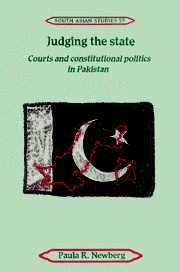Book contents
- Frontmatter
- Contents
- Preface
- Introduction
- 1 Structuring the state
- 2 Constituting the state (1947–1958)
- 3 Confining courts and constitutions (1958–1969)
- 4 Seeking justice (1969–1972)
- 5 Testing courts and constitutionalism (1972–1977)
- 6 Silencing courts, muting justice (1977–1988)
- 7 Reviving judicial powers (1988–1993)
- 8 Judging the state
- Table of cases
- Bibliography
- Index
- Cambridge South Asian Studies
5 - Testing courts and constitutionalism (1972–1977)
Published online by Cambridge University Press: 06 January 2010
- Frontmatter
- Contents
- Preface
- Introduction
- 1 Structuring the state
- 2 Constituting the state (1947–1958)
- 3 Confining courts and constitutions (1958–1969)
- 4 Seeking justice (1969–1972)
- 5 Testing courts and constitutionalism (1972–1977)
- 6 Silencing courts, muting justice (1977–1988)
- 7 Reviving judicial powers (1988–1993)
- 8 Judging the state
- Table of cases
- Bibliography
- Index
- Cambridge South Asian Studies
Summary
How can you think
the coming storm a mere illusion?
Kishwar Naheed, “Speech Number 27.”The greater the importance of safeguarding the community from incitements to the overthrow of our institutions by force and violence, the more imperative is the need to preserve inviolate the constitutional rights of free speech, free press and free assembly in order to maintain the opportunity for free political discussion, to the end that the Government may be responsive to the will of the people and that changes, if desired, may be obtained by peaceful means.
Justice Sardar Muhammad IqbalThe years of People's Party government reflected the accumulated fears, dreams and contradictions of Pakistani political life. Despite protests against the PPP's ascendance to power – for allegations of its manipulating elections results, its partial culpability for the war and its refusal to hold new polls – the country held high hopes for a new constitution. Sadly, it was soon sullied by the way the government used it; restrictions on constitutional rule negated aspirations for participatory democracy.
The PPP held power from December 1971 until July 1977, but its short rule encompassed tremendous progress and forceful regression: national programs were hindered by party factionalism, divisive and destructive as ever; feudal interests dominated debate on taxation, land tenure and industrial policy, slowing whatever progress might have been achieved by careful nationalization and appropriate tax policy; rivalries among the provinces, fueled by the Prime Minister's continual quest for power, reached new intensity, dominating foreign and domestic policy debate alike.
- Type
- Chapter
- Information
- Judging the StateCourts and Constitutional Politics in Pakistan, pp. 136 - 170Publisher: Cambridge University PressPrint publication year: 1995

